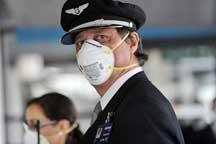80% of New Yorkers hospitalized with A/H1N1 flu have underlying risk factors
2009-06-04 09:41 BJTSpecial Report: World tackles A/H1N1 flu |
NEW YORK, June 3 (Xinhua) -- A preliminary analysis of 152 hospitalized H1N1 flu patients in New York City shows that at least 82 percent have belonged to one or more groups at higher risk of severe illness or complications from influenza.
According to a press release issued by the New York Health Department on Wednesday, more than 300 New Yorkers have been hospitalized with H1N1 flu since late April, when the flu was first detected in the city.
The Health Department on Wednesday linked two more deaths to A/H1N1 influenza. The latest fatalities -- both in adults in their early and mid 40s -- bring the total number of deaths to seven in the city.
All deaths to date have occurred in people under 65 years of age (the median age is 43). Six of the seven deaths have occurred in people with underlying conditions (including obesity) that can interfere with normal breathing, and one death is still under investigation.
According to the Health Department, those at higher risk of flu complications include: people who are over 65, under age 2, or pregnant; people with chronic lung problems, such as asthma or emphysema; people with chronic heart, kidney, liver or blood disorders; people with neurological disorders that can cause breathing problems; people with diabetes; people whose immune systems are weakened due to illness or medication; and people under 18 years who are on long-term aspirin therapy.
Illness from A/H1N1 influenza continues to occur throughout New York City, with most people experiencing only mild illness, says the press release.
However, emergency room visits have declined somewhat after spiking dramatically during the third week of May, and school attendance has climbed to 87 percent, after weeks of high absenteeism.
So far, the most common risk factor in New York City has been asthma -- an underlying risk factor among 41 percent of the New Yorkers hospitalized for A/H1N1 flu. Other important risk factors include being less than 2 years of age (18 percent of hospitalized patients), having a compromised immune system (13 percent), having heart disease (12 percent), or being pregnant.
The Health Department recommends that people with asthma, or any of the other conditions listed here, to call a doctor right away if they develop flu-like illness.
Editor: Zhang Pengfei | Source: Xinhua
 Mail
Mail Share
Share Print
Print
 Play VideoGlobal A/H1N1 cases exceed 18,900
Play VideoGlobal A/H1N1 cases exceed 18,900


 Video
Video









 2009 China Central Television. All Rights Reserved
2009 China Central Television. All Rights Reserved